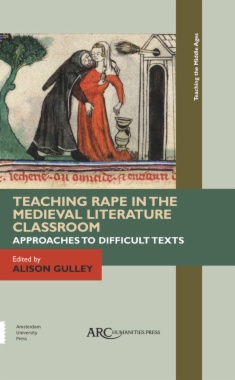<p >Teachers of medieval literature help students bridge thetemporal, contextual, and linguistic gulfs between the Middle Ages and thetwenty-first century. When episodes involving rape are thrown into the mix,that task becomes even more difficult. Students and teachers bring a variety ofexperiences to the classroom. This volume proposes ways educators can helpstudents navigate the divide between in- and out-of-class experiences and offerssuggestions for classroom activities and assignments for a range of medievaltexts, as well as insight into the concerns of students in various settings.</p>
- Front Cover
- Front matter
- Half-title
- Title Page
- Copyright
- Copyright
- Table of Contents
- Body
- 1. Introduction: Teaching Rape and Meeting the Challenges of the Twenty-First-Century Classroom
- 2. Medieval Saints and Misogynist Times: Transhistorical Perspectives on Sexual Violence in the Undergraduate Classroom
- Sexual Violence and Saints’ Lives
- Back to the Future: Rereading Contemporary Perspectives on Rape as “Medieval”34
- Works Cited
- 3. Teaching Medieval Rape Culture across Genre: Insights from Victimology
- Clearly Defining Rape
- The Victim Herself: Characterological Judgments, Victim-Blaming, Precipitating Factors
- Bystander Theory
- Conclusion
- Works Cited
- 4. Bringing the Bystander into the Humanities Classroom: Reading Ancient, Patristic, and Medieval Texts on the Continuum of Violence
- Introduction
- Institutional Background
- Bringing the Bystander into Literary Analysis
- Boys Will Be Boys: The Inevitability/Naturalness of Patriarchy
- #NotAllMen
- Conclusion
- Works Cited
- 5. From Bystander to Upstander: Reading the Nibelungenlied to Resist Rape Culture
- The Tenth Aventiure
- Reading the Tenth Adventure
- From Bystanders to Upstanders
- Conclusion
- Works Cited
- Web Resources
- 6. Speech, Silence, and Teaching Chaucer’s Rapes
- 7. Classroom PSA: Values, Law, and Ethics in “The Reeve’s Tale”
- Day One
- Day Two
- Teaching Outcomes
- Works Cited
- 8. “How do we know he really raped her?”: Using the BBC Canterbury Tales to Confront Student Skepticism towards the Wife of Bath
- 9. Teaching the Potiphar’s Wife Motif in Marie de France’s Lanval
- The Problem of False Allegations
- The Outlines of the Potiphar’s Wife Motif
- Literature as a Tool for Truthfulness
- Works Cited
- 10. Sexual Compulsion and Sexual Violence in the Lais of Marie de France
- Teaching “Lanval” in Brit Lit I
- Teaching the Lais in Medieval Lit
- Works Cited
- 11. Troubadour Lyric, Fin’amors, and Rape Culture
- 12. The Knight Coerced: Two Cases of Raped Men in Chivalric Romance
- Medieval Literature in the Gen Eds: A Pedagogical Note
- Seeing through Gray: Positive Consent as Interpretive Aid
- The Rape of Sir Launcelot (Morte d’Arthur)
- Launcelot’s Rape: Man vs. Narrative
- Launcelot’s Reaction: Placing Blame
- The Rape of Sir Perion (Amadis de Gaula)
- Perion’s Rape: Short, then Silent
- Illuminating Contexts, Interpretive Frameworks
- Context Applied: Understanding Perion’s Silence
- Concluding Thoughts
- Works Cited
- 13. Teaching Rape to the He-Man Woman Haters Club: Chrétien de Troyes at a Military School
- 14. Rape, Identity, and Redemption: Teaching “Sir Gowther” in the Community College Classroom
- Back matter

